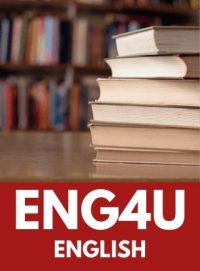ENG4U - Grade 12 English (Upgrade)

Course Description For ENG4U Grade 12 English (Upgrade) Online Course
Grade 12 English (ENG4U) emphasizes the consolidation of literacy, communication, and critical and creative thinking skills necessary for success in academic and daily life. Students will analyse a range of challenging literary texts from various periods, countries, and cultures; interpret and evaluate informational and graphic texts, and create oral, written, and media texts in a variety of forms. An important focus will be on using academic language coherently and confidently, selecting the reading strategies best suited to particular texts and particular purposes for reading, and developing greater control in writing. The course is intended to prepare students for university, college, or the workplace.
Summary Of Units And Timelines For Grade 12 English (Upgrade) ENG4U
Below is the suggested sequence of course unit delivery as well as the recommended number of hours to complete the respective unit. For complete details of targeted expectations within each unit and activity, please see each Unit Overview found in the ENG4U course profile.
| Unit Order | Unit Name | Suggested Time |
|---|---|---|
| Unit 0 | Prerequisite Review | 10 Hours |
| Unit 1 | Literary Criticism | 20 Hours |
| Unit 3 | Poetry | 20 Hours |
| Mid Semester Point | ||
| Unit 3 | Essay Analysis | 20 Hours |
| Unit 4 | Novel Studies “The Wars” | 25 Hours |
| Unit 5 | Course Summative | 13 Hours |
| FINAL | Final Exam | 2 Hours |
| View Sample Gradebook Total | 110 Hours | |
Please be aware that, as per Ministry guidelines, OVS has a mandatory minimum requirement of 11 days enrollment for students to be eligible for a midterm report card and 21 days enrollment to be eligible for a final report card in repeat/upgrade courses.
Fundamental Concepts Covered in Upgrade Courses Online Course
The expectations in the compulsory online course of the course curriculum are organized in four strands, or broad areas of learning: Oral Communication, Reading and Literature Studies, Writing, and Media Studies. Students learn best when they are encouraged to consciously monitor their thinking as they learn, and each strand includes expectations that call for such reflection. The knowledge and skills described in the expectations in the four strands of the language curriculum will enable students to understand, respond to, create, and appreciate a full range of literary, informational, and media texts. The areas of learning are closely interrelated, and the knowledge and skills described in the four strands are interdependent and complementary. Teachers plan activities that blend expectations from the four strands in order to provide students with the kinds of experiences that promote meaningful learning and that help them recognize how literacy skills in the four areas reinforce and strengthen one another.
Teaching and Learning Strategies in an Online School
Teachers will bring enthusiasm and varied teaching and assessment approaches to the classroom, addressing individual students’ needs and ensuring sound learning opportunities for every student. The activities offered should enable students to relate and apply these concepts to the social, environmental, and economical conditions and concerns of the world in which they live. Opportunities to relate knowledge and skills to these wider contexts will motivate students to learn in a meaningful way and to become life-long learners. The English curriculum is based on the premise that all students can be successful language learners. One of the keys to student success in mastering language skills is high-quality instruction. Teachers who provide quality instruction respect students’ strengths and address their learning needs, using assessment information to plan instruction. They clarify the purpose for learning, help students activate prior knowledge, and differentiate instruction for individual students and small groups according to need. Teachers explicitly teach and model learning strategies and encourage students to talk through their thinking and learning processes. They also provide many opportunities for students to practice and apply their developing knowledge and skills. Effective teaching approaches involve students in the use of higher-level thinking skills and encourage them to look beyond the literal meaning of texts and to think about fairness, equity, social justice, and citizenship in a global society.
Assessment & Evaluation
As summarized in Growing Success 2010, the primary purpose of assessment and evaluation is to improve student learning. Information gathered through assessment helps teachers to determine students’ strengths and weaknesses in their achievement of the curriculum expectations in each course.
This information also serves to guide teachers in adapting curriculum and instructional approaches to students’ needs and in assessing the overall effectiveness of programs and classroom practices. As part of assessment, teachers provide students with descriptive feedback that guides their efforts towards improvement. Evaluation refers to the process of judging the quality of student work on the basis of established criteria, and assigning a value to represent that quality. All curriculum expectations must be accounted for in instruction, but evaluation focuses on students’ achievement of the overall expectations.
A students’ achievement of the overall expectations is evaluated on the basis of his or her achievement of related specific expectations. Teachers will use their professional judgement to determine which specific expectations should be used to evaluate achievement of overall expectations, and which ones will be covered in instruction and assessment but not necessarily evaluated. In order to ensure that assessment and evaluation are valid and reliable, and that they lead to the improvement of student learning, teachers must use assessment and evaluation strategies that:
- Address both what students learn and how well they learn
- Are based both on the categories of knowledge and skills and on the achievement level descriptions given in the achievement chart
- Are varied in nature, administered over a period of time, and designed to provide opportunities for students to demonstrate the full range of their learning
- Are appropriate for the learning activities used, the purposes of instruction, and the needs and experiences of the students
- Are fair to all students
- Accommodate students with special education needs, consistent with the strategies outlined in their Individual Education Plan
- Accommodate the needs of students who are learning the language of instruction
- Ensure that each student is given clear directions for improvement
- Promote students’ ability to assess their own learning and to set specific goals
- Include the use of samples of students’ work that provide evidence of their achievement
- Are communicated clearly to students and parents at the beginning of the school year and at other appropriate points throughout the school year.
The achievement chart outlines four categories of knowledge and skills. They include; knowledge and understanding, thinking, communication and application. Teachers will ensure that student work is assessed and/or evaluated in a balanced manner with respect to the four categories, and that achievement of particular expectations is considered within the appropriate categories. A final grade is recorded for this course, and a credit is granted and recorded for this course if the student’s grade is 50% or higher. The final grade for this course will be determined as follows:
- Seventy percent of the grade will be based on evaluations conducted throughout the course. This portion of the grade should reflect the student’s most consistent level of achievement throughout the course, although special consideration should be given to more recent evidence of achievement.
- Thirty percent of the grade will be based on a final evaluation and administered towards the end of the course.
Accommodations for students with an IEP in an Online School
All students can succeed. Some students are able, with certain accommodations, to participate in the regular course curriculum and to demonstrate learning independently. Accommodations allow access to the course without any changes to the knowledge and skills the student is expected to demonstrate. The accommodations required to facilitate the student’s learning can be identified by the teacher, but recommendations from a School Board generated Individual Education Plan (IEP) if available can also be consulted. Instruction based on principles of universal design and differentiated instruction focuses on the provision of accommodations to meet the diverse needs of learners.
Examples of accommodations (but not limited to) include:
- Adjustment and or extension of time required to complete assignments or summative tasks
- Providing alternative assignments or summative tasks
- Use of scribes and/or other assistive technologies
- Simplifying the language of instruction
Resources
Teachers will bring additional resources and teaching materials that provide a rich and diverse learning environment. Units in this course profile make specific reference to a variety of readings required for this course but can be substituted for any relevant and approved text.
Reference: English, The Ontario Curriculum, Grades 11 to 12, 2007 (Revised) Ministry of Education of Ontario
Ontario Secondary School Diploma (OSSD) Requirements for all course.
Sample Lesson Video: Grade 12 English (Upgrade) (ENG4U)
Frequently Asked Questions
What is ENG4U?
ENG4U is a Grade 12 English high school course at a University preparation level. ENG4U is a required prerequisite course for most university programs.
What are 4U courses?
4U refers to the Grade level of the courses and the pathway. 4 means it is a grade 12 course and U means it is a university preparation course.
What is the prerequisite course for ENG4U?
Prerequisite: Documentation showing you have successfully passed this course before
Click here for more information on Ontario secondary curriculum and their prerequisites
How long does it take to complete the ENG4U online course?
At Ontario Virtual School (OVS) you can complete an online highschool credit courses as quickly as 4 weeks, or take as long as 12 months.
Student & Parent Recommendations
Testimonials for ENG4U - Grade 12 English (Upgrade)
At first when I started at Ontario Virtual School I did not have much confidence during the online course I was doing ENG4U. However, this course taught me a lot, such as using my time productively. I highly recommend this online course and OVS to others.Muhammad
Google Reviews for ENG4U - Grade 12 English (Upgrade)






